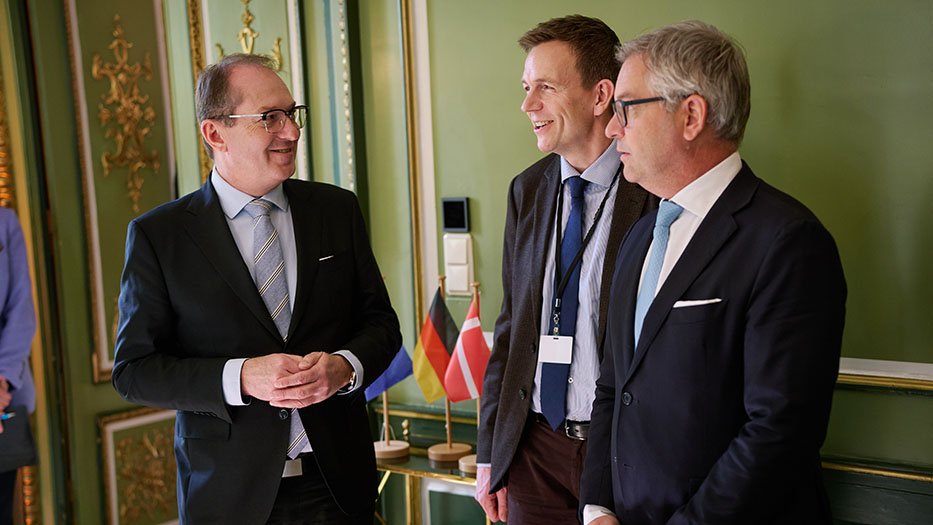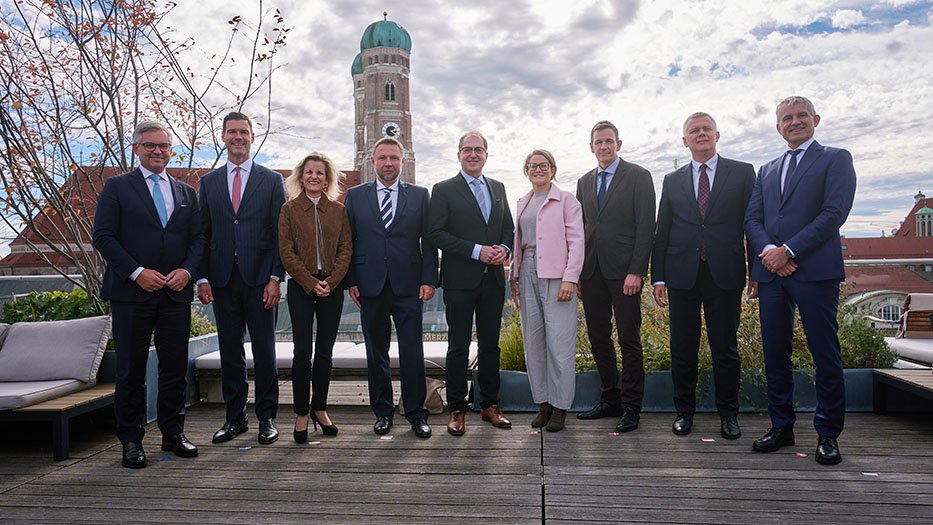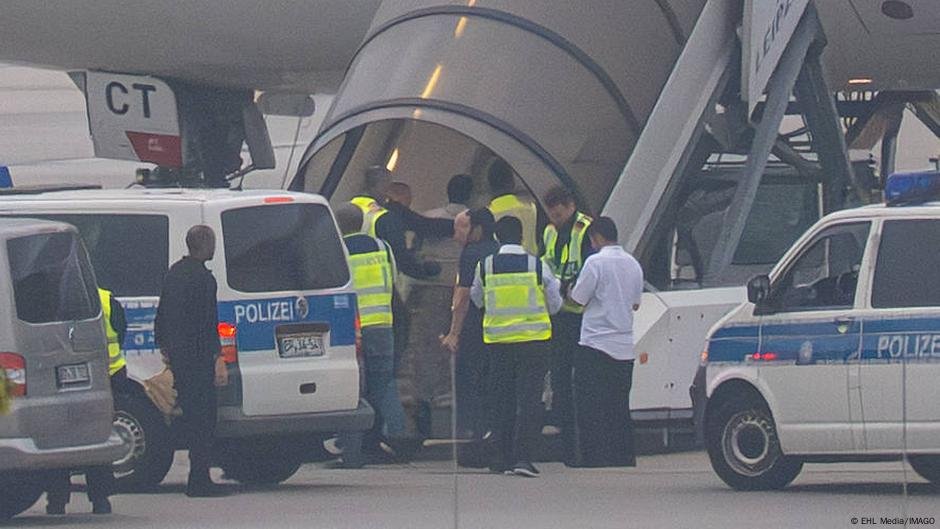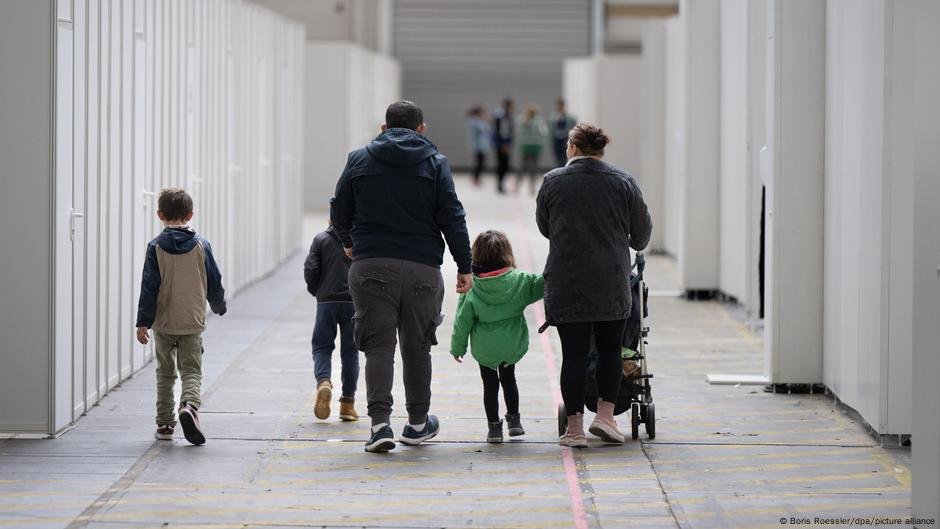The German Interior Ministry, run by the CDU/CSU, is under fire from members of its coalition partner after it announced last week that it was planning to place migrants to be deported into indefinite pre-removal detention. The announcement came amid a raft of new measures aimed at toughening up migration policy.
Germany’s Interior Minister Alexander Dobrindt has been busy in recent weeks announcing a raft of new measures aimed at toughening up the country’s migration policies still further. But these plans are also the target of criticism from some members of the party with which the conservative CDU/CSU parties share power, the social democratic SPD party.
Last week, at a migration conference in Munich, on October 4, Dobrindt announced that he was hoping to create detention centers where he would be able to hold migrants due for deportation "indefinitely."
Most of those who might be sent to such a center, should they get up and running, would be migrants who have been convicted of crimes, or are judged to be a danger to German society. However, this weekend, the policy was criticized by members of the SPD party, who share power in Germany’s coalition government.
Read AlsoGermany moves to implement EU asylum reform
'Unconstitutional'
A spokesperson for the SPD-run Interior Ministry in Hamburg (a city-state) and one of Germany’s 16 regional governments, reportedly told the newspaper Welt am Sonntag, that indefinite detention without a date for an actual deportation would be against the German constitution.

Regional ministers in the states of Mecklenburg-Vorpommern and Lower Saxony also said that they would consider indefinite detention "unconstitutional," reported Germany’s public broadcaster Deutschlandfunk.
The pro-migrant organization Pro Asyl told Deutschlandfunk they believed that Dobrindt’s suggestions were simply "undoable in a democracy."
According to a press release from Germany’s Federal Interior Ministry (BMI), "Criminals and people who pose a danger to society who are due to be deported should be transferred to detention centers indefinitely, to prevent them from disappearing from the authorities’ radar and thus avoiding the deportation order."
Read AlsoGermany's new government suspends refugee resettlement
'Intensify deportations'
This statement, outlined the ministry, was part of a series of measures designed to be able to "intensify deportations" across Europe. Talking with his EU counterparts from Poland, Denmark, Belgium, Luxembourg, the Netherlands, Sweden and Switzerland, as well as the EU Commissioner for Interior policy and Migration, Magnus Brunner, Dobrindt said he believed the Common European Asylum System GEAS should "not only be implemented, but should become harder and stricter."

At the meeting, Dobrindt also called for "innovative solutions," including making sure that bureaucratic processes were made simpler and more functional, especially once it had been decided that an application for asylum had been refused.
Appeals against the refusal should no longer be allowed to delay the process that followed the refusal, underlined Dobrindt. He added that he believed that new applications for asylum could only be put forward if there were new reasons and proof for a further application, and that states would only be responsible for processing asylum claims within a year of someone arriving in their country.
Furthermore, Dobrindt called for better data exchange via the EU Migration database EURODAC, so that countries could quickly see where a migrant or asylum seeker has been and whether they have already submitted an asylum application.
Finally, Dobrindt said he hoped that EU countries would "intensify their work with transit countries and countries of origin." He added that he thought that the implementation of "return hubs" and "places of safety in third countries" should be part of "strategic partnerships with countries outside the EU."
Read AlsoPakistan detains Afghans waiting for Germany relocations
Deportations to Afghanistan
Dobrindt concluded, saying that the strategies and concepts discussed in Munich were not meant to have concluded the issues, but were a step towards more discussions, with a view to "making these processes faster in the future than they have been in the past."
Despite the criticism that Dobrindt is attracting with his statements, he announced on October 12 that his planned "deportation scheme with the Taliban" was "nearing conclusion."
"We are in the middle of very advanced discussions, so much so that we can already say we are counting on being able to announce an agreement very soon, in order to be able to deport migrants back to Afghanistan regularly," Dobrindt reportedly told the news portal The Pioneer on Saturday (October 11).
Officials from the German Interior Ministry spent the last weekend in Kabul, conducting "technical talks with representatives of the Taliban, and working out how best to organize the deportations," reported the French news agency Agence France Presse (AFP).
Dobrindt has also been criticized for beginning discussions with the Taliban, since it has not been recognized by the wider international community, including Germany, since it seized power violently in August 2021.

However, as he announced that his government was about to unveil a new agreement with the Taliban, Dobrindt told reporters, that he believed it was strange that critics seemed to find it "moral to allow Qatar to negotiate on behalf of states like Germany when deportations to Afghanistan were needed, but that it was deemed not so moral if a state undertook those negotiations itself." Dobrindt added, reported AFP, that he would be prepared to fly to Kabul himself, "if it was necessary" to conclude the agreement properly.
Read AlsoGerman-Afghan relations under scrutiny over deportations
Deportations to Syria
According to reports in Germany’s tabloid Bild newspaper quoted by AFP, Dobrindt is prepared to do "everything I can to make sure that the deportation with Afghanistan functions and that we can also conclude something similar with Syria."
Bild added that they believed that once those agreements were underway, Dobrindt was hoping to send back not just convicted criminals and those who pose a danger to the state but even other young men whose asylum claims had been refused.
The tabloid added that in the future, those who visited Syria might also lose their protection status in Germany. "We are working on a deportation agreement with Syria, and we will begin with sending back convicted criminals," Dobrindt reportedly told Bild.

Since 2021, Germany has operated two deportation flights to Afghanistan, one last August under the previous SPD / Green / Liberal coalition and one this July under the current government.
The German government is also trying to hold firm on its policy to refuse asylum applications from applicants who should be applying in other EU countries, at least until the solidarity mechanism is signed up to by all EU member states. Poland announced it had been granted an exception from the mechanism over the weekend.
A representative of the SPD, Sonja Eichwede, told the Welt am Sonntag that she believed Germany needed to "work with its European partners" and that "solidarity must be seen as both give and take."
Read AlsoMore Syrians returning to Syria from Germany but numbers still low
